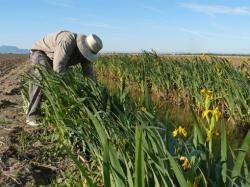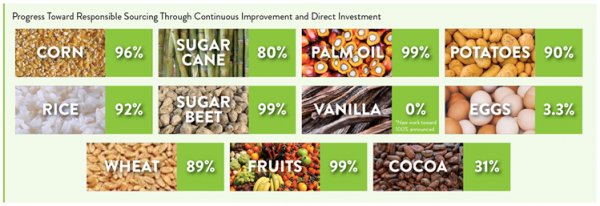
The United Nations estimates that by 2050, there will be 9.7 billion people living on Earth, with most of the population growth coming from developing countries. To meet the nutrition needs of these billions of people, the Food and Agriculture Organization of the United Nations (FAO) notes that most of the new food production required – 80 percent in fact – will need to come from increasing yields on current farmland, with just 20 percent coming from expanding the farming land we have today.
At Kellogg, we’ve been actively working to help achieve global food security through addressing the interconnected issues of accessible and nutritious food, sustainable production and climate resiliency. And we continue to ask: how can we support farmers to ensure they are equipped to meet this need in the future? Throughout our history, we have partnered with organizations committed to this same goal to inform and improve our efforts. Key stakeholders – like The Nature Conservancy, Syngenta, the farmers in our sourcing regions, and the Environmental Working Group, for example – push our thinking and offer innovative solutions.
“For the past five years, we’ve had a shared commitment with Kellogg to help farmers identify and implement more sustainable practices and improve transparency through producer partnerships, data analytics and agronomic insights,” said Liz Hunt, Sustainable Solutions Manager at Syngenta, a global agribusiness company.
Specifically, we’ve worked with Syngenta to help farmers adopt and track conservation practices on their farms in Michigan, Arkansas, and other U.S. states. This year, we have also partnered with Syngenta to launch our new, more user-friendly Kellogg Grower Survey (KGS), which we originally developed in 2015 to better document and understand current farming practices, including soil management and biodiversity measures. When industry-standard tools like Field to Market’s Fieldprint Calculator and Sustainable Agriculture Initiative’s (SAI) Farmer Self-Assessment are not available, we use the KGS to track on-farm management decisions with farmers over time. The survey focuses on suppliers of our priority ingredients, including wheat, rice, corn, potato, sugar beets, and fruits. Our intent with KGS and other measurement tools is to improve transparency in our ingredient sourcing, understand farm practices in a whole-farm context, and prioritize where further collaboration may be needed to support continuous improvement and food security.
“Getting the information is half the battle,” said Scott Faber, senior vice president at the Environmental Working Group. “Kellogg is digging into how farmers are using pesticides, particularly glyphosate, and pushing to understand if there are viable alternatives. The first step to minimizing the use of pesticides is understanding how they are being used.”
We are also supporting farmers through our Kellogg’s Origins™ Programme, through which we have supported more than 329,000 farmers through 40-plus projects to date worldwide. By the end of 2030, we hope to reach 1 million farmers, especially women smallholders and workers through programs focused on climate, social and financial resiliency.
Examples of our efforts to help farmers include implementing climate-smart conservation practices, such as integrated pest management, biological pest control measures, and cover crops, which can help reduce the need for chemical plant protection. As part of this program, we introduced the Natural Heritage Initiative in Spain and the UK to support the increase of natural care practices that benefit pollinators and habitats, such as planting wildflower fields and flowering cover crops, reducing pesticide use, and integrated pest management. We also advocate for sustainable agriculture in the United States. In 2016, Kellogg voiced our support of the White House Pollinator Health Task Force’s strategy and its call for research, public education, and public-private partnerships to support pollinator populations. At that time, we also began our participation in five (now six) USDA Regional Conservation Partnership Programs, which support cost share for farmers looking to implement conservation practices on their farms.
As a leading global plant-based food company, we have a responsibility to positively impact the people, communities and planet through how we grow, make and share our foods. Our partners – including suppliers, farmers and non-governmental organizations – are critical to our ability to make a difference.


